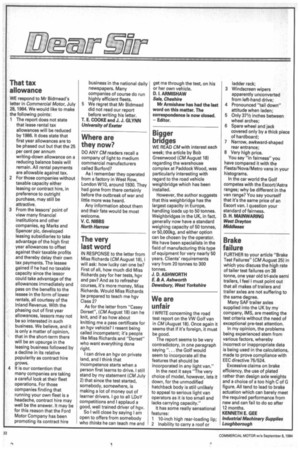That tax allowance
Page 24

If you've noticed an error in this article please click here to report it so we can fix it.
WE respond to Mr Bidmead's letter in Commercial Motor, July 28, 1984. We would like to make the following points: 1 The report does not state that lease rental tax allowances will be reduced by 1986. It does state that first year allowances are to be phased out but that the 25 per cent per annum writing-down allowance on a reducing balance basis will remain. All rental payments are allowable against tax.
2 For those companies without taxable capacity either leasing or contract hire, in preference to outright purchase, may still be attractive.
3 From the lessors' point of view many financial institutions and other companies, eg Marks and Spencer plc, developed leasing subsidiaries to take advantage of the high first year allowances to offset against their taxable profits and thereby delay their own tax payments. The lessee gained if he had no taxable capacity since the lessor could take advantage of the allowances immediately and pass on the benefits to the lessee in the form of lower rentals, all courtesy of the Inland Revenue. With the phasing out of first year allowances, lessors may not be so interested in such business. We believe, and it is only a matter of opinion, that in the short-term there will be an upsurge in the leasing business followed by a decline in its relative popularity as contract hire grows.
4 It is our contention that many companies are taking a careful look at their fleet operations. For those companies finding that running your own fleet is a headache, contract hire may well be the answer. It may be for this reason that the Ford Motor Company has been promoting its contract hire business in the national daily newspapers. Many companies of course do run highly efficient fleets.
5 We regret that Mr Bidmead did not read our report before writing his letter. T. E. COOKE and J. J. GLYNN University of Exeter




























































































